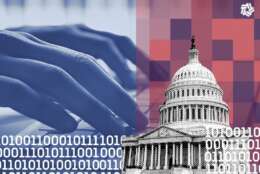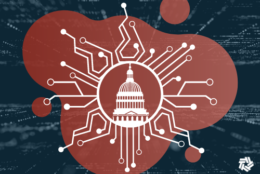Automation
-
The Conflict Observatory brings together teams and technology to track the conflict in Ukraine. The project sprung out of evidence-based policymaking efforts.
February 13, 2023 -
You know when you're using an app that uses GPS in a major city, and it can't quite pin point your location? Well, a new tech company in San Francisco may have a new way of fixing that.
February 13, 2023 -
2023 promises to be an eventful year for federal cybersecurity teams. Already, we’ve welcomed in a new Congress, which is bound to introduce new cybersecurity legislation, especially following the signing of the $1.7 trillion omnibus spending bill in December.
February 09, 2023 -
The Federal Risk and Authorization Management Program, known as FedRAMP, is supposed to make it easier for agencies to use commercial cloud computing. FedRAMP, as policy, has been around for a dozen years, but only became law at the end of last year.
February 09, 2023 -
As agencies continue to implement the customer experience executive order, they will increasingly need to modernize legacy systems so they are flexible enough to meet changing user needs.
February 07, 2023 -
OPM also wants to update several vetting factors to make it harder for domestic extremists to find employment in the government.
February 06, 2023 -
A bill before the House would create a new cadre of people to help the government in case of a serious cyber attack. The National Digital Reserve Corps would be managed by the General Services Administration.
February 06, 2023 -
The U.S. federal government has made incredible strides in modernizing its use of technology in recent years. From customer experience (CX) to cybersecurity and beyond, agencies have taken this critical challenge head on.
February 02, 2023 -
It might be the biggest thing in computing since the microprocessor. But quantum computing doesn't come with guaranteed security. Among the challenges, developing cryptography algorithms that resist quantum computing.
February 02, 2023 -
Few people heard of the FAA's NOTAM system until it crashed and brought aviation to a standstill earlier this month. The FAA blamed a contractor for accidentally deleting files, such that the system failed to synchronize.
January 31, 2023 -
The federal government provides systems that citizens across our nation rely on daily, especially during some of the most crucial moments in their lives.
January 31, 2023 -
The Defense Advanced Research Projects Agency or DARPA, has launched a project to help advance semiconductor technology in the United States. It is teaming up with the non-profit Semiconductor Research Corporation and academia to work on seven specific chip technologies.
January 26, 2023 -
A digital workforce will drive the government of the future, but how can you build workers’ skills at pace?
January 24, 2023 -
The Federal Trade Commission has proposed a rule to ban non-compete employee contractors. Federal services contractors are decidedly not of one mind on this issue.
January 24, 2023 -
Alan Thomas, the former commissioner of the Federal Acquisition Service at the General Services Administration and an operating advisor to Enlightenment Capital, explains how agencies can get out from under a growing mound of technical debt.
January 20, 2023













